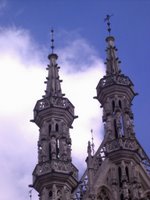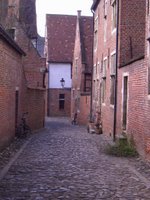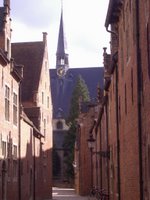 Yesterday we drove over to Leuven, 60kms south-east of Antwerpen; a university town with something of the delicious atmosphere I'd found in Ghent.
Yesterday we drove over to Leuven, 60kms south-east of Antwerpen; a university town with something of the delicious atmosphere I'd found in Ghent. I had heard of it but imagined it was some drab little town close to Brussels however this drab little town was first mentioned back the 9th century and by the 12th century it had become an important trading centre. Like Bruges, it suffered when the textile industry went into decline in the 14th century but was saved with the dawn of a new golden age one hundred years later. Industry flourished and the University of Leuven was founded. The gothic-styled exterior of the Town Hall was stunning and I don't think the digital camera managed to give more than a taste of it.
I had heard of it but imagined it was some drab little town close to Brussels however this drab little town was first mentioned back the 9th century and by the 12th century it had become an important trading centre. Like Bruges, it suffered when the textile industry went into decline in the 14th century but was saved with the dawn of a new golden age one hundred years later. Industry flourished and the University of Leuven was founded. The gothic-styled exterior of the Town Hall was stunning and I don't think the digital camera managed to give more than a taste of it. We wandered through the grounds of Leuven's Beguinage. I'm not sure that I've written of the beguinage concept before, despite visiting one in Bruges.
We wandered through the grounds of Leuven's Beguinage. I'm not sure that I've written of the beguinage concept before, despite visiting one in Bruges. The sign at the entrance explained that...Flemish beguinages are a unique testimony to the medieval mystical movement which produced them. Beguines were ‘religious women’, widows or spinsters who wished to live an independent but committed life outside the recognised orders with their vows of fidelity and poverty. They organised themselves in self-supported cities of peace with architectural and urban qualities. Leuven and 12 other Beguinages have been listed on the UNESCO World Heritage list in recognition of their exceptional universal value. Leuven's Beguinage (in Dutch it is begijnhof)was founded in the 13th century. They are places of peace even with students and professors as tenants today.
The sign at the entrance explained that...Flemish beguinages are a unique testimony to the medieval mystical movement which produced them. Beguines were ‘religious women’, widows or spinsters who wished to live an independent but committed life outside the recognised orders with their vows of fidelity and poverty. They organised themselves in self-supported cities of peace with architectural and urban qualities. Leuven and 12 other Beguinages have been listed on the UNESCO World Heritage list in recognition of their exceptional universal value. Leuven's Beguinage (in Dutch it is begijnhof)was founded in the 13th century. They are places of peace even with students and professors as tenants today. I thought of Dunedin, my university city, when Gert showed me the Old Market Square, otherwise known as 'the greatest bar of the western world'; Dunedin because the students are clearly the patrons of this square filled with bars, pubs and cafes, hence his familiarity with this town he once studied in some years ago.
I thought of Dunedin, my university city, when Gert showed me the Old Market Square, otherwise known as 'the greatest bar of the western world'; Dunedin because the students are clearly the patrons of this square filled with bars, pubs and cafes, hence his familiarity with this town he once studied in some years ago.Like Ghent, it's a place I would like to return to with more time.
No comments:
Post a Comment